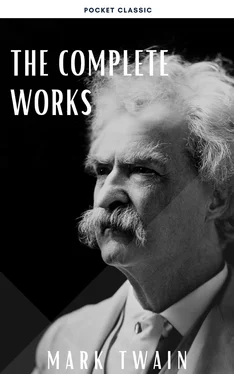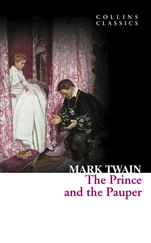This was all fine and pleasant. Tom's pulse beat high, and a glad light was in his eye. He bore himself right gracefully, and all the more so because he was not thinking of how he was doing it, his mind being charmed and occupied with the blithe sights and sounds about him—and besides, nobody can be very ungraceful in nicely-fitting beautiful clothes after he has grown a little used to them—especially if he is for the moment unconscious of them. Tom remembered his instructions, and acknowledged his greeting with a slight inclination of his plumed head, and a courteous "I thank ye, my good people."
He seated himself at table, without removing his cap; and did it without the least embarrassment; for to eat with one's cap on was the one solitary royal custom upon which the kings and the Cantys met upon common ground, neither party having any advantage over the other in the matter of old familiarity with it. The pageant broke up and grouped itself picturesquely, and remained bareheaded.
Now to the sound of gay music the Yeomen of the Guard entered,—"the tallest and mightiest men in England, they being carefully selected in this regard"—but we will let the chronicler tell about it:—
"The Yeomen of the Guard entered, bareheaded, clothed in scarlet, with golden roses upon their backs; and these went and came, bringing in each turn a course of dishes, served in plate. These dishes were received by a gentleman in the same order they were brought, and placed upon the table, while the taster gave to each guard a mouthful to eat of the particular dish he had brought, for fear of any poison."
Tom made a good dinner, notwithstanding he was conscious that hundreds of eyes followed each morsel to his mouth and watched him eat it with an interest which could not have been more intense if it had been a deadly explosive and was expected to blow him up and scatter him all about the place. He was careful not to hurry, and equally careful not to do anything whatever for himself, but wait till the proper official knelt down and did it for him. He got through without a mistake—flawless and precious triumph.
When the meal was over at last and he marched away in the midst of his bright pageant, with the happy noises in his ears of blaring bugles, rolling drums, and thundering acclamations, he felt that if he had seen the worst of dining in public it was an ordeal which he would be glad to endure several times a day if by that means he could but buy himself free from some of the more formidable requirements of his royal office.
Foo-foo the First
Miles Hendon hurried along toward the Southwark end of the bridge, keeping a sharp look-out for the persons he sought, and hoping and expecting to overtake them presently. He was disappointed in this, however. By asking questions, he was enabled to track them part of the way through Southwark; then all traces ceased, and he was perplexed as to how to proceed. Still, he continued his efforts as best he could during the rest of the day. Nightfall found him leg-weary, half-famished, and his desire as far from accomplishment as ever; so he supped at the Tabard Inn and went to bed, resolved to make an early start in the morning, and give the town an exhaustive search. As he lay thinking and planning, he presently began to reason thus: The boy would escape from the ruffian, his reputed father, if possible; would he go back to London and seek his former haunts? No, he would not do that, he would avoid recapture. What, then, would he do? Never having had a friend in the world, or a protector, until he met Miles Hendon, he would naturally try to find that friend again, provided the effort did not require him to go toward London and danger. He would strike for Hendon Hall, that is what he would do, for he knew Hendon was homeward bound and there he might expect to find him. Yes, the case was plain to Hendon—he must lose no more time in Southwark, but move at once through Kent, toward Monk's Holm, searching the wood and inquiring as he went. Let us return to the vanished little King now.
The ruffian whom the waiter at the inn on the bridge saw 'about to join' the youth and the King did not exactly join them, but fell in close behind them and followed their steps. He said nothing. His left arm was in a sling, and he wore a large green patch over his left eye; he limped slightly, and used an oaken staff as a support. The youth led the King a crooked course through Southwark, and by-and-by struck into the high road beyond. The King was irritated, now, and said he would stop here—it was Hendon's place to come to him, not his to go to Hendon. He would not endure such insolence; he would stop where he was. The youth said—
"Thou'lt tarry here, and thy friend lying wounded in the wood yonder? So be it, then."
The King's manner changed at once. He cried out—
"Wounded? And who hath dared to do it? But that is apart; lead on, lead on! Faster, sirrah! Art shod with lead? Wounded, is he? Now though the doer of it be a duke's son he shall rue it!"
It was some distance to the wood, but the space was speedily traversed. The youth looked about him, discovered a bough sticking in the ground, with a small bit of rag tied to it, then led the way into the forest, watching for similar boughs and finding them at intervals; they were evidently guides to the point he was aiming at. By-and-by an open place was reached, where were the charred remains of a farm-house, and near them a barn which was falling to ruin and decay. There was no sign of life anywhere, and utter silence prevailed. The youth entered the barn, the King following eagerly upon his heels. No one there! The King shot a surprised and suspicious glance at the youth, and asked—
"Where is he?"
A mocking laugh was his answer. The King was in a rage in a moment; he seized a billet of wood and was in the act of charging upon the youth when another mocking laugh fell upon his ear. It was from the lame ruffian who had been following at a distance. The King turned and said angrily—
"Who art thou? What is thy business here?"
"Leave thy foolery," said the man, "and quiet thyself. My disguise is none so good that thou canst pretend thou knowest not thy father through it."
"Thou art not my father. I know thee not. I am the King. If thou hast hid my servant, find him for me, or thou shalt sup sorrow for what thou hast done."
John Canty replied, in a stern and measured voice—
"It is plain thou art mad, and I am loath to punish thee; but if thou provoke me, I must. Thy prating doth no harm here, where there are no ears that need to mind thy follies; yet it is well to practise thy tongue to wary speech, that it may do no hurt when our quarters change. I have done a murder, and may not tarry at home—neither shalt thou, seeing I need thy service. My name is changed, for wise reasons; it is Hobbs—John Hobbs; thine is Jack—charge thy memory accordingly. Now, then, speak. Where is thy mother? Where are thy sisters? They came not to the place appointed—knowest thou whither they went?"
The King answered sullenly—
"Trouble me not with these riddles. My mother is dead; my sisters are in the palace."
The youth near by burst into a derisive laugh, and the King would have assaulted him, but Canty—or Hobbs, as he now called himself—prevented him, and said—
"Peace, Hugo, vex him not; his mind is astray, and thy ways fret him. Sit thee down, Jack, and quiet thyself; thou shalt have a morsel to eat, anon."
Hobbs and Hugo fell to talking together, in low voices, and the King removed himself as far as he could from their disagreeable company. He withdrew into the twilight of the farther end of the barn, where he found the earthen floor bedded a foot deep with straw. He lay down here, drew straw over himself in lieu of blankets, and was soon absorbed in thinking. He had many griefs, but the minor ones were swept almost into forgetfulness by the supreme one, the loss of his father. To the rest of the world the name of Henry VIII. brought a shiver, and suggested an ogre whose nostrils breathed destruction and whose hand dealt scourgings and death; but to this boy the name brought only sensations of pleasure; the figure it invoked wore a countenance that was all gentleness and affection. He called to mind a long succession of loving passages between his father and himself, and dwelt fondly upon them, his unstinted tears attesting how deep and real was the grief that possessed his heart. As the afternoon wasted away, the lad, wearied with his troubles, sank gradually into a tranquil and healing slumber.
Читать дальше










